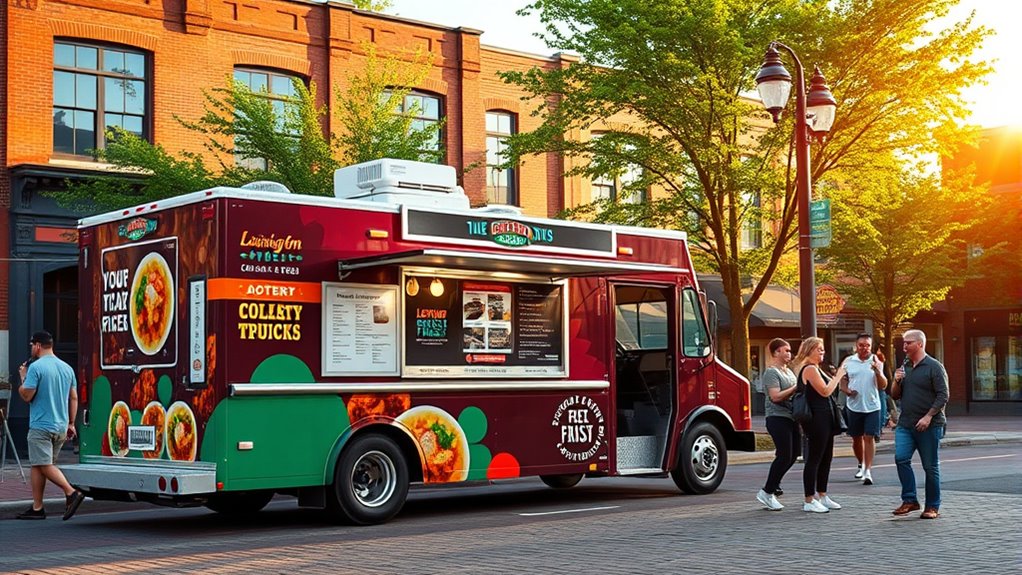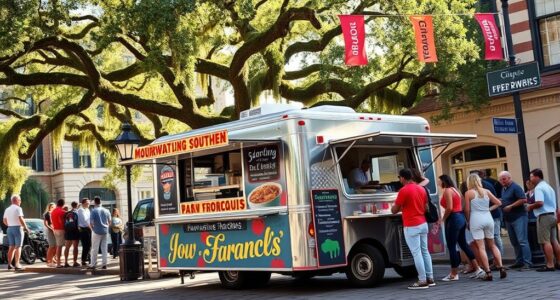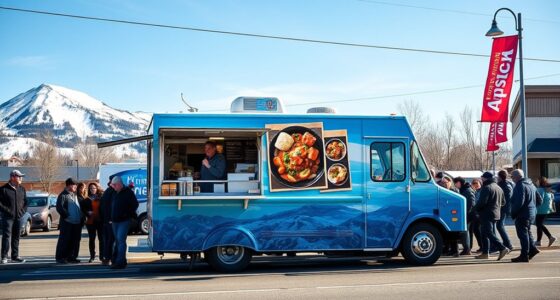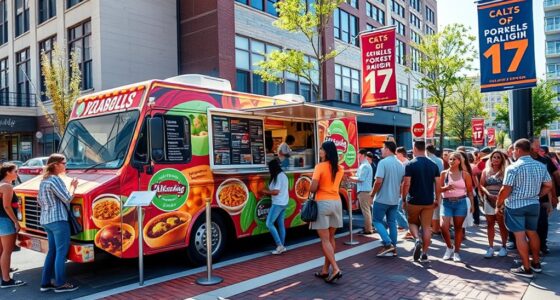To open a food truck in Lexington, Kentucky, start by securing a Mobile Food Vendor Permit and guarantee compliance with local zoning laws near schools and residential areas. Budget $35,000 to $60,000 for a used truck and account for yearly costs around $1,200 to $2,500 for fuel and maintenance. Choose strategic locations, develop a vibrant menu, and use social media and apps to attract customers. Continue exploring these steps to set your food truck up for success.
Key Takeaways
- Obtain a Mobile Food Vendor Permit from Lexington, ensuring compliance with zoning, health, and fire safety regulations.
- Budget $35,000 to $90,000 for truck purchase and $1,200 to $2,500 annually for operating expenses.
- Select compliant locations, avoiding restricted zones like schools and residential areas, and adhere to zoning laws.
- Develop a focused menu with local flavors, dietary options, and maintain food safety standards through proper handling and sanitation.
- Market your food truck via social media, branding, community events, and location tracking apps to attract and retain customers.
Navigating Permits and Licensing Requirements
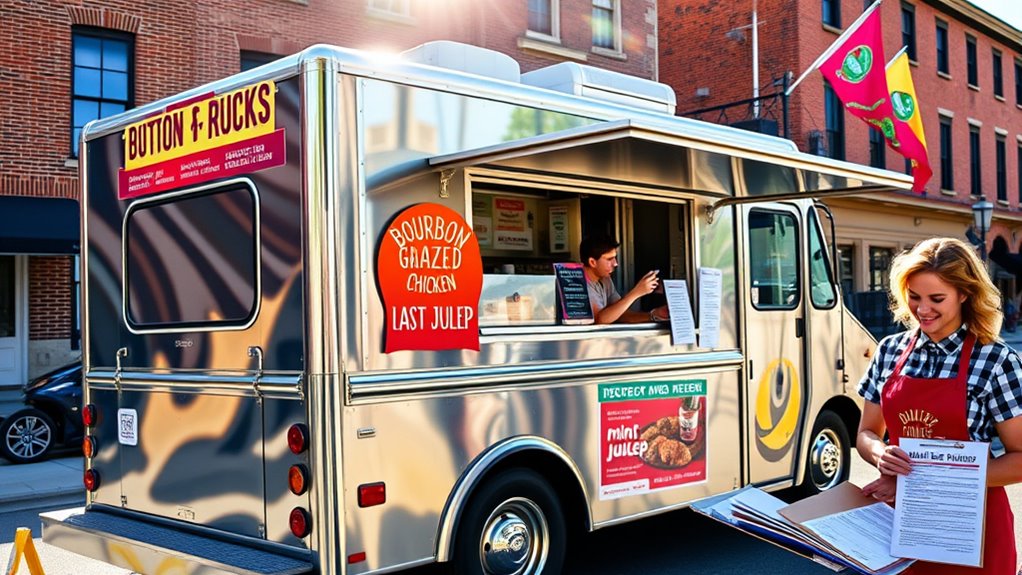
To legally operate a food truck in Lexington, Kentucky, you must obtain the necessary permits and licenses before hitting the streets. Start by applying for a Mobile Food Vendor Permit issued by the city, which authorizes your truck to operate within city limits. Be aware that certain areas, like near schools or residential zones, are restricted by zoning regulations. You’ll need to pay an annual or location-based registration fee, such as $25 per spot or a $100 yearly blanket fee. You also can’t operate in the same location for more than 14 days consecutively without waiting 30 days. Additionally, you must pass health and fire safety inspections, use a licensed commissary kitchen, and acquire a Kentucky Sales Tax Permit. All permits should be visibly displayed during operation. In addition, the Lexington-Fayette County Health Department conducts regular inspections to ensure compliance with food safety standards, and failure to meet these requirements can result in fines or suspension of your operating permit. It’s also important to familiarize yourself with zoning regulations to avoid operating in restricted areas or violating local ordinances.
Understanding Costs and Fee Structures
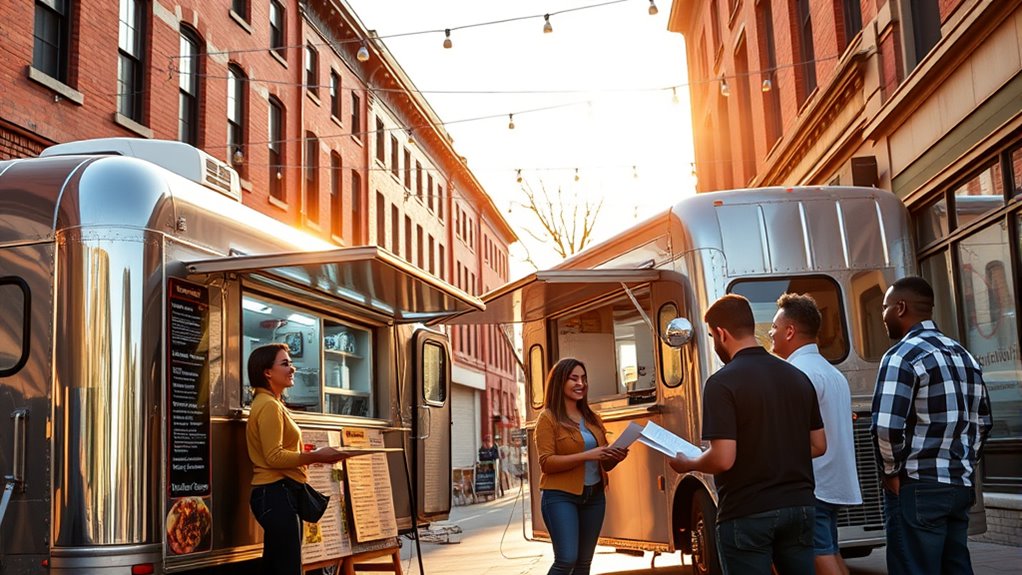
Understanding the costs and fee structures involved in operating a food truck in Lexington is key to budgeting wisely and guaranteeing your venture stays profitable. You’ll face initial investments, recurring expenses, and permit fees. Imagine: 1. Purchasing a truck or trailer, which can range from $30,000 to $90,000, or finding a used truck for $35,000 to $60,000, but with potential repair costs. 2. Covering annual fuel, propane, and maintenance costs, totaling around $1,200 to $2,500, plus vehicle registration fees of $100 to $300. 3. Budgeting for permits, which can average around $1,864 nationally but may be less in Lexington, plus costs for licenses, insurance, and menu-specific equipment. Planning for these expenses ensures you stay financially prepared from the start, especially considering start-up costs that can fluctuate based on customization and equipment choices. Additionally, understanding nutritional value of juices can help diversify your menu offerings to attract health-conscious customers.
Choosing the Right Locations and Zoning Compliance
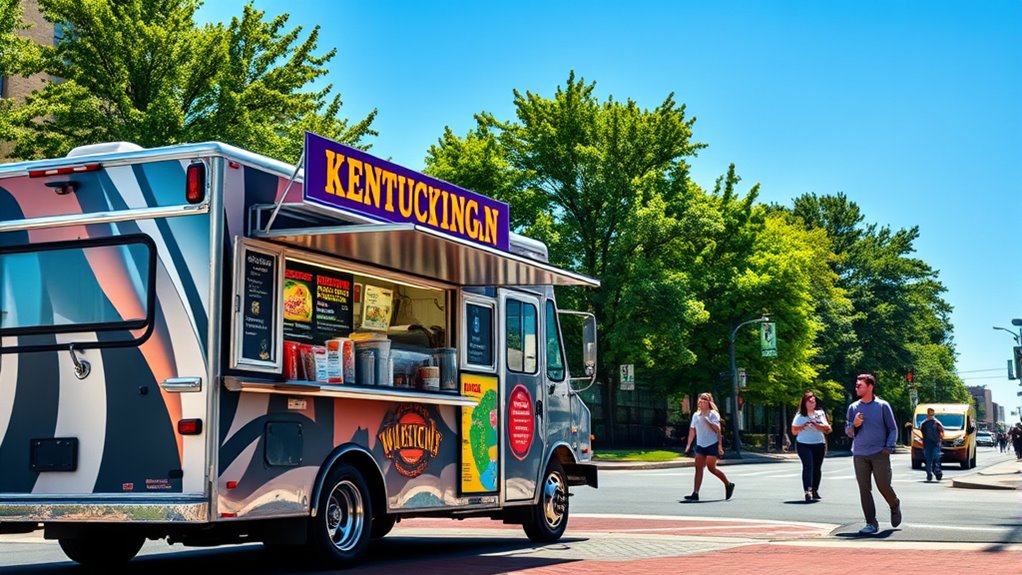
Guiding Lexington’s zoning regulations is essential for ensuring your food truck operates legally and reaches your target customers. You must verify that your chosen locations comply with local zoning laws, which restrict operation near schools, parks, and residential areas. You cannot operate at the same spot for more than 14 days without a 30-day break, and you need to register each location with fees involved. Use the table below to assess zoning classifications and restrictions:
| Zoning Type | Allowed Uses | Restrictions |
|---|---|---|
| Commercial | Food trucks, retail | No operation near residential areas |
| Mixed-Use | Food trucks, shops | Permit required for certain zones |
| Residential | Usually restricted | Limited or prohibited |
| Industrial | Food trucks permitted | Check specific zone rules |
| Special Zones | Permitted during events | Obtain special permits |
Zoning Compliance is crucial because local ordinances may vary, and failure to adhere can result in fines or shutdowns. Understanding zoning classifications helps ensure your food truck stays within legal boundaries and operates smoothly within Lexington’s regulations.
Developing a Food Menu and Ensuring Food Safety
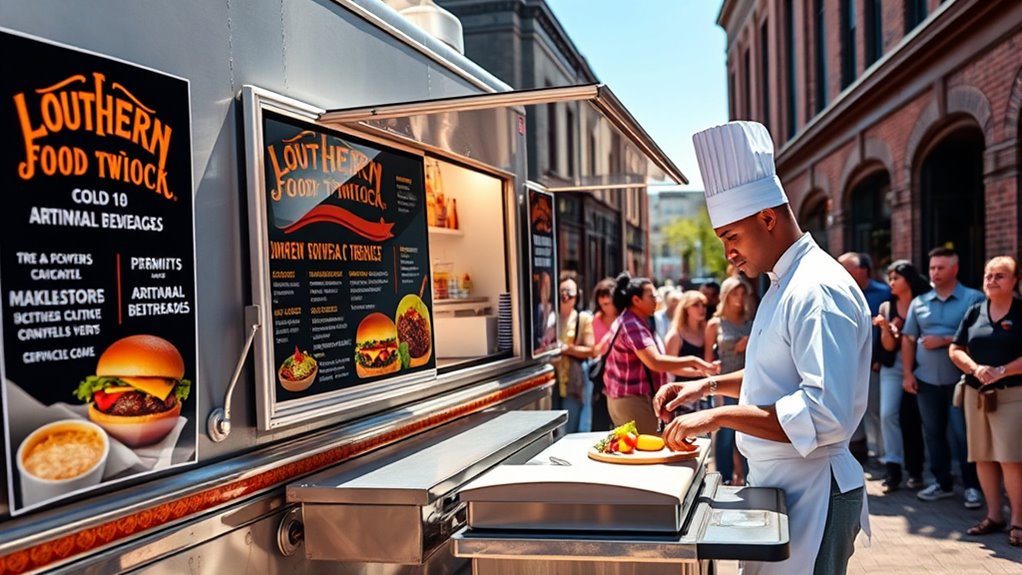
Selecting the right location and complying with zoning laws sets the foundation for a successful food truck operation, but creating a compelling menu and maintaining food safety are equally essential. You’ll want to craft a concise menu that highlights popular local flavors and seasonal ingredients, making it easy to prepare in your compact kitchen. Focus on items that balance variety with operational efficiency, like vegetarian and gluten-free options, to appeal to a broader audience. Supporting infrastructure and equipment are crucial for maintaining food safety standards and efficient service. Imagine:
- A menu featuring vibrant, locally inspired dishes that can be whipped up quickly.
- Clear labeling for dietary options to attract health-conscious customers.
- Organized storage and prep areas that prevent cross-contamination and ensure freshness.
- Proper food safety protocols that help you meet health department regulations and protect your customers.
Prioritize food safety by following sanitation protocols, proper handling, and regular equipment cleaning.
Effective Marketing and Operational Strategies
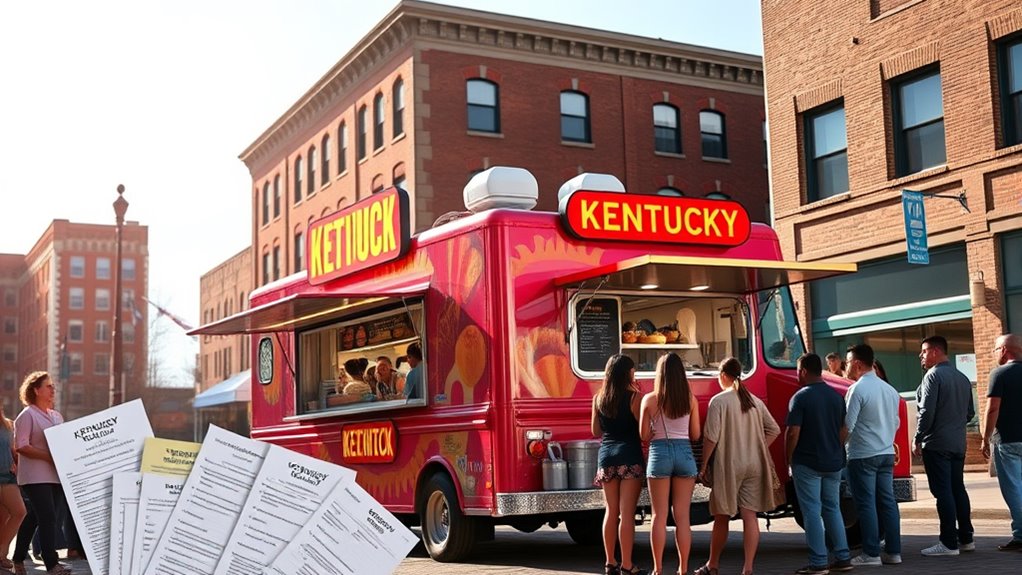
Implementing effective marketing and operational strategies is essential to standing out in Lexington’s competitive food truck scene. You need a consistent brand identity—think a memorable logo, vibrant truck wrap, and clear messaging—that resonates with your target audience. Use social media platforms like Instagram, Facebook, and Twitter to showcase high-quality photos, videos, and live updates of your locations. Engage followers with polls and respond promptly to reviews. Register your truck on tracking apps like Truckster and StreetFoodFinder to keep customers informed about your whereabouts. Collaborate with local businesses and participate in community events to boost visibility. Track your marketing efforts through analytics, adjust tactics based on data, and incorporate customer feedback. Regularly measuring your marketing efforts through analytics and customer feedback is crucial for refining your approach and maximizing your success. Additionally, understanding the importance of quality assurance can help ensure that your food consistently meets customer expectations and builds a strong reputation.
Frequently Asked Questions
Are There Specific Health Certifications Required for Staff Working on the Truck?
You need to make certain your staff has the proper health certifications. All food handlers must obtain a valid food handler card from the Lexington-Fayette County Health Department, which costs $23 and is valid for two years. Managers require a separate food manager certification costing $85. Staff have 30 days from hire to get certified, and you must keep copies on file for health inspections to avoid fines or suspension.
Can I Operate a Food Truck at Private Events Without a Permanent Permit?
You can’t operate a food truck at private events without a permit. Lexington requires a Mobile Food Vendor Permit for any temporary or private event. You must submit an application at least 48 hours in advance, pay the registration fee, and display all permits visibly. Without these permits, you’re operating illegally, which could lead to fines or shutdowns. Always verify you have the necessary approvals before serving at private gatherings.
What Are the Penalties for Operating Without Proper Permits in Lexington?
If you operate a food truck without proper permits in Lexington, you could face serious penalties. You might be charged with a misdemeanor, leading to fines up to $100 per day, and each day of violation counts separately. Civil penalties can reach up to $25,000 per violation, and severe cases involving health hazards could escalate to felony charges with jail time. The health department enforces these rules and can order your closure until you comply.
How Do I Renew My Permits Annually or When They Expire?
To renew your permits, start by checking the expiration date and submitting renewal applications before they expire. You’ll need to pass health and fire safety inspections, update any changes in your menu or operation, and provide proof of a licensed commissary kitchen. Pay the renewal fees, which are similar to the original costs, and make certain your sales tax permit is current. Keep logs and update location info to stay compliant.
Are There Restrictions on Serving Alcohol From a Food Truck in Lexington?
You should know that serving alcohol from your food truck in Lexington comes with restrictions. You need a specific alcohol permit, and sales are limited to permitted locations and times. You can’t serve alcohol everywhere, especially in dry zones or outside approved areas. Also, your truck must meet health and safety standards, and all alcohol sales must adhere to state and local regulations. Always coordinate with local authorities to ensure you’re following all restrictions.
Conclusion
Starting your food truck in Lexington is like planting a seed—careful planning and persistence will help it blossom. By securing the right permits, managing costs, choosing prime locations, crafting a tasty menu, and marketing smartly, you set yourself up for success. Remember, each step is a building block toward turning your culinary dream into a vibrant reality on wheels. Stay focused, and watch your food truck journey flourish like a well-tended garden.
